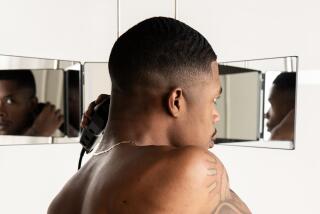They Stay in Harmony With the Past : Music: Barbershop quartets in South Bay thrive despite stigma of being passe. Singers say the unique style strikes a chord with audiences.
- Share via
The guys in the only South Bay organization devoted to the barbershop quartet know what people are thinking.
“When you say barbershop singing, it has a stigma,” said Torrance resident Chris Wilson, 32, one of the 82 members of the South Bay chapter of the Society for the Preservation and Encouragement of Barbershop Quartet Singing in America. “People think it’s goofy.”
Keith Klein, 35, also of Torrance, remembers putting it even more bluntly to himself before deciding to join the club two years ago: “Why would I want to sing songs written in the last century with a bunch of old guys?”
But any misconceptions about the distinctly American musical style seem to fade when the group belts out its versions of “No Business Like Show Business” or “My Wild Irish Rose,” or hears the applause the group gets during its many public appearances.
In February, the group sang “Oh, What a Beautiful Morning” from the Manhattan Beach Pier for “CBS This Morning.” And a quartet from the South Bay chapter of the society is lined up to sing the national anthem at a Los Angeles Raiders football game later this year.
The barbershop style, a harmonious blend of tenor, lead baritone and bass singers, originated in the mid-19th Century in the parlors of America. The style picked up momentum at the turn of the century when men, waiting for their morning shave at the local barbershop, would sing four-part harmonies. The singing style reached its zenith on the vaudevillian stages of the 1920s.
“In the old days, they would really sing at the barbershop,” said Harvey Raider, a 57-year-old electronics salesman from Manhattan Beach. “They did it for their own entertainment.”
However, with the advent of radio and cinema, the musical tradition fell into decline. Today, South Bay barbershoppers, whose membership has dropped slightly because of recent aerospace layoffs, are determined to keep the singing style alive.
Like other national chapters, the South Bay group sponsors a scholarship program in high schools and colleges to encourage youths to take up the art.
In addition to performing at weddings, banquets and fairs, the singers, only a few of whom sport the traditional handlebar mustaches, are gaining popularity from their Valentine’s Day exploits. Continuing a five-year club tradition, six quartets this year delivered 125 singing Valentines, a rose and a card to sweethearts for $30.
Once people give the high-spirited music a chance, say club members, they’re hooked.
“It’s the harmony,” said Wilson, a drama arts major in college who is now a sales representative for an auto sound company. “When everyone is singing exactly right, it creates an expanded sound. It sounds like more than four guys are singing. That’s the gravy for us and that’s when people get excited.”
“You can tell when you hit a good chord,” added Raider, who’s been with the group six years. “You get goose bumps.”
Harmonizing, however, takes practice for the mostly middle-aged men whose professions range from auto mechanic to physician. The group meets every Wednesday night at St. Andrews Presbyterian Church in Redondo Beach. Practice starts promptly at 7:30 and lasts until 10, when many members reconvene at a local bar and continue singing and socializing, sometimes as late as 1 a.m.
To further hone their skills, most club members sing along with barbershop tapes while driving.
“When the freeway is congested, I don’t give a happy damn because I’m enjoying my singing,” said Charlie Thompson, 54, of Manhattan Beach, an aerospace worker who has been with the group for nine years. “I’m sure people are saying ‘Who is that guy talking to? There’s no one else in the car.’ ”
Whether it’s in the car, in the shower or on stage, the barbershop singers say they have come to rely on the emotional release that their pastime brings.
“I’m a trial attorney, mainly on the defense side, and you have a lot of day-to-day anxieties accumulating. You need a break,” said Michael Cervenak, 58, of Westchester. “It’s a great hobby and a lot of fun.”
While there may be joy in their singing, there can be sorrow, too. There are barbershop songs the group can’t perform in public.
“The guys just can’t make it through a few songs because they are so sad,” Cervenek said.
Once such song is entitled “My Daddy is Only a Picture,” which recounts the tale of a boy who has never seen his father. “You want to talk about something heart-wrenching?” asked Cervenak.
“Barbershop singing is deeply emotional singing,” Klein added. “You see a lot of people in life with dead faces. But out here (on stage), it’s not allowed.”
More to Read
The biggest entertainment stories
Get our big stories about Hollywood, film, television, music, arts, culture and more right in your inbox as soon as they publish.
You may occasionally receive promotional content from the Los Angeles Times.










